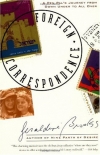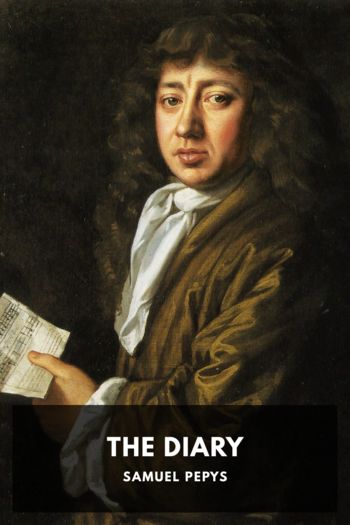Foreign Correspondence: A Pen Pal's Journey by Geraldine Brooks (finding audrey .TXT) 📗

- Author: Geraldine Brooks
Book online «Foreign Correspondence: A Pen Pal's Journey by Geraldine Brooks (finding audrey .TXT) 📗». Author Geraldine Brooks
From the rim of that flat plain, I had no sense of my city’s dramatic topography. The harbor that now so dominates my image of the city does not figure in any of my early memories. Perhaps it is because young children are unmoved by scenery of all sorts, their focal point always on the faces of the people around them. Dimly, I knew that the harbor existed, because it was where they were building the fanciful, toylike Opera House. My mother and her friends sometimes shared a ticket in the Opera House lottery. If they won, I supposed, we would get title to the building, and all go to live under the soaring white sails. Perhaps I would be allowed to use the smooth, plunging roofs as slippery-slides.
We did not go to the city or the beach. Because we had no car, even short journeys loomed in family discussions like epic treks. Besides, my parents were too busy on weekends fixing gutters and fighting rising damp in our Victorian terrace house.
From the outside, the Bland Street terrace was a picturesque pair of houses linked by a common center wall. A cake-decoration trim of cast-iron balconies squiggled its lacy way across the facade. But the charm was all exterior. Inside, the rooms were dank in winter, stifling in summer, the few windows taking no account of the Mediterranean-style climate of the new city in which it had been set down. Its design wasn’t meant for Sydney. Like a good part of the city’s population of that time, the terrace style had been lifted straight from cold, crowded cities such as London or Dublin.
While my mother battled broken sash cords and crumbling plaster, my father hacked away at the tangles of morning glory in the overgrown garden or slapped sealer on the rusty iron roof. Weekends were the only times I really saw him. Weekdays, he left early for his job as a proofreader on a daily newspaper. Early in the morning while I was still drowsy, he was a fleeting scent of Californian Poppy hair oil and a sweet, sharp taste of sugary black coffee in a hurried goodbye kiss. Most nights, he was out until way past my bedtime, singing at nightclubs, in recording-studio sessions, or on the radio.
But on weekends he would be home: up the dizzying extension ladder, shirtless, tanned, glistening with sweat. His unlined face and firm torso looked like a young man’s. He never walked anywhere; he bounced like a boy. He liked to sprint across busy streets, dodging cars with the graceful swoops of a matador. Yet by the time I was two, he was already fifty.
My mother, in her mid-thirties, was the adult in our lives. Weekdays, I was her shadow, roaming the rooms of the big house while my sister Darleen, an unfathomable eight years older, was away all day at school. I would climb upstairs to the iron-lace balcony, peering through its arabesques at the street below.
It was through that filigree that the outside world gradually came into focus. Every afternoon, in the garden of the monastery adjacent to the Catholic school across the road, a blacksoutaned figure paced back and forth, reading his Office from a small prayer book. The sight of this slender cleric soothed me: I thought he was God. I was glad we had him so handy.
We lived on Bland Street during the bland years of Australia’s history. Like the 1950s in the United States, the postwar years in Australia were a timid, conservative time. My parents’ generation had been wracked by the Depression and the war. Happy to be alive and employed, most of them were too exhausted to contemplate change. The right-wing government that came to power in 1949 stayed in office for more than twenty years. Its leader was Robert Menzies, an Anglophile who felt more at home at a palace ceremony in London than he did in his own country. Returning from England in 1941, he wrote in his journal that “a sick feeling of repugnance grows in me as I near Australia.”
His pro-British, pro-monarchy rhetoric infected us all with the sense that we were second-raters—inferior convict stock who should continue to look to the culture and history of our colonizer rather than try to forge an identity of our own. So, instead of admiring the spiky beauty of native grevillias and the hazy, bottlebrush-shaped blooms of callistimon, we planted our gardens with English primroses and watched them wilt in the heat. We decorated our walls with portraits of Queen Elizabeth and prints of landscapes by Constable and Turner. At Christmas, when overripe papayas fell from our backyard tree with a wet splat, we sweated our way through a dinner designed for a European winter solstice, with dried fruit on the table and pudding flamed in brandy for dessert.
We had no idea how to use our benign climate to grow a wider variety of produce than our English and Irish forebears had known. At the greengrocer, lettuce meant iceberg. A seafood dinner meant fried fish and chips—never the cheap, plentiful produce of the harbor, the calamari or delicious, nutty-fleshed crustaceans called Balmain bugs. Richer families sent their children to be educated at private institutions with names like “The King’s School” and “Scotch College” where elocution teachers vainly tried to round out the flattened vowels of a Cockney and Celtic heritage. The country’s premiere institution of higher learning, the University of Sydney, stated its mission of aping Oxford and Cambridge in its motto, Sedare Mens Edam Mutato (Same Place Different Skies). It didn’t even have a chair of Australian literature until the 1960s. At sports events and official functions, we stood for the playing of our national anthem: “God Save





Comments (0)